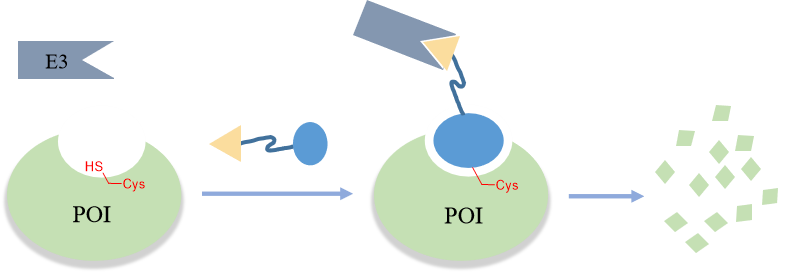BOC Sciences is a leading CRO that focuses on developing novel small molecules for targeted protein degradation. We use cutting-edge technology and expertise to design and develop covalent PROTACs for drug discovery and development. By partnering with us, you will receive customized covalent PROTAC development services that allow you to select targets based on your needs.
What is Covalent PROTAC?
Proteolysis Targeting Chimeras (PROTACs) induce the degradation of proteins of interest (POIs) through the ubiquitin-proteasome system. The E3 ligand is able to recruit E3 ligase, while the warhead binds to POI that is recognized and degraded by the proteasome after ubiquitinating via E3 ligase. Both PROTAC and covalent inhibitors are two promising small molecule drug forms, and in recent years, a new technology has emerged to integrate the two together - covalent PROTAC.
Covalent PROTAC, as the name implies, is a PROTAC molecule that can covalently bind to proteins, thereby producing greater binding capacity and inducing more protein degradation. Covalent PROTACs include reversible and irreversible covalent PROTACs, in which the reversible covalent PROTACs can enhance the affinity with the POI and can be released after the POI is degraded to participate in the next round of catalytic degradation, which may be the direction of the next generation of protein degradation therapies.

Design of Covalent PROTACs
Covalent PROTACs are a subclass of PROTACs that use a covalent bond to link the ligands to the POI and E3 ubiquitin ligase. Covalent binding is attributed to the electrophilic warheads (e.g. acrylamide, cyanoacrylamide) on the PROTAC molecule and the nucleophilic residues (e.g. cysteine, lysine) on the protein, which undergo nucleophilic addition or nucleophilic substitution reactions to form covalent bonds. Similar to covalent inhibitors, covalent PROTAC binds mainly to cysteine residues (Cys) on the protein to help form the ternary complex of POI-PROTAC-E3 ligase.
In fact, in addition to the POI ligand, the E3 ligase ligand at the other end of the PROTAC molecule can also be designed to be covalently bound. PROTAC based on E3 ligase covalent ligands would allow PROTAC molecules to target POIs that are difficult to bind to non-covalent ligands, expanding the scope of PROTAC applications. In addition, the E3-PROTAC covalent complexes prompt the ubiquitination and degradation of POI, which can participate in the next round of POI binding as a complex, simplifying the process that originally required the formation of a ternary complex to the formation of a binary complex and improving the efficiency of degradation.
Our Services for Covalent PROTACs
- Design ligands with electrophilic groups and ensure proper stability and solubility of the ligands.
- Identification of ligands that can covalently bind to the POI and the E3 ligase.
- Optimization of the linker between the ligands to allow for optimal positioning of the ligands on the POI and E3 ligase.
- Evaluation of the activities of covalent PROTACs such as off-target toxicity, binding affinity.
Advances in Covalent PROTACs
A major area of research on covalent PROTACs is cancer therapy. Recent studies have shown that covalent PROTACs can target the oncogenic proteins BRD4 and BCL-2 and induce their degradation in cancer cells, leading to significant growth inhibition and cell death, or sensitizing cancer cells to chemotherapy. Covalent PROTACs also have applications in the treatment of neurodegenerative diseases. Covalent PROTACss are able to target tau (Alzheimer's disease-associated protein) or α-synuclein (Parkinson's disease-associated protein) in vitro to induce their degradation and reduce their aggregation or to reduce their toxicity in cellular models of PK disease, respectively. In addition, Covalent PROTACs can serve as a novel approach against drug-resistant bacterial infections. Covalent PROTAC targets DNA gyrase (an important bacterial protein) and overcome antibiotic resistance, thus effectively killing drug-resistant bacteria.


